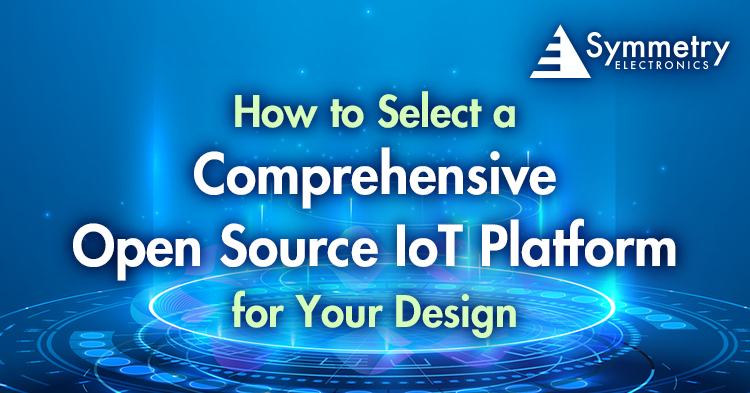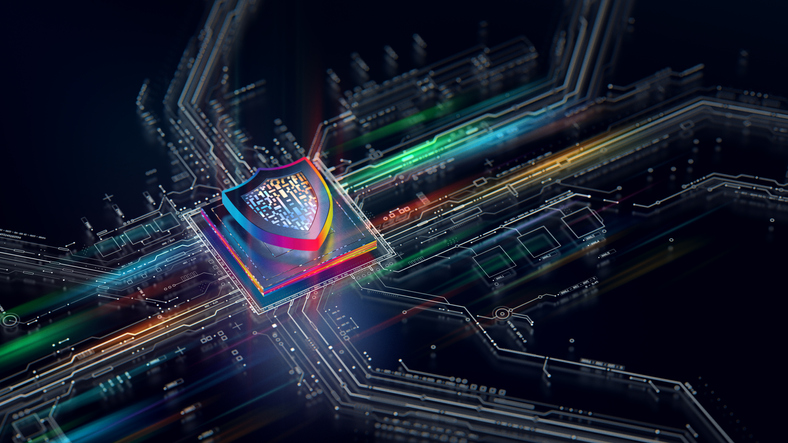- Home
- Symmetry Blog
- How to Select a Comprehensive Open Source IoT Platform for Your Design
How to Select a Comprehensive Open Source IoT Platform for Your Design
About Jari Haiston

Internet of Things (IoT) platforms are software solutions that enable the connection, management, and analysis of data from various devices and sensors. There is a wide range of IoT platforms available to developers, each boasting its own individual features that developers must ensure align with their project’s specific requirements, but why are open source IoT platforms advantageous?
What is an Open Source IoT Platform?
An open-source IoT platform is a software framework or ecosystem that provides tools, libraries, and services for building, managing, and deploying Internet of Things (IoT) applications and devices. What sets open-source IoT platforms apart from proprietary alternatives is their open nature, meaning that the source code of the platform is made available to the public, and users are free to view, modify, and distribute it according to the terms of an open-source license, such as the GNU General Public License (GPL) or the Apache License.
Why Should Developers Utilize Open Source IoT Platforms?
Open-source IoT platforms offer several advantages, such as being cost-effective. These platforms are typically available for free or at significantly lower costs compared to proprietary solutions, resulting in substantial savings on software licensing and subscription fees. One of the core benefits is flexibility and customization. Open-source IoT platforms empower developers to tailor and modify the software to align precisely with their project requirements. This adaptability proves particularly valuable in IoT, where diverse device types and communication IoT protocols are common.
Furthermore, open-source projects foster a sense of community support. They thrive on active and engaged communities of developers and users, offering access to a wealth of collective knowledge, shared experiences, and community-contributed resources, including plugins, extensions, and documentation.

Are Open Source IoT Platforms Secure?
The transparency of open-source platforms enhances security by allowing users to review the source code, thus facilitating the quick discovery and resolution of vulnerabilities. These platforms often prioritize interoperability, supporting various communication protocols and device types, simplifying the management of a wide range of IoT devices within a single ecosystem.
Open-source IoT platforms are designed with scalability in mind, accommodating IoT infrastructure growth as needs expand. They mitigate vendor lock-in risks, offering the freedom to choose and switch between hardware and software components. These platforms accelerate development through pre-built components and libraries, saving time and effort.
Moreover, open-source grants security control by providing access to the source code, enabling tailored security measures and timely updates. These projects tend to have a longer lifespan and encourage community contributions, fostering ongoing innovation. Many adhere to industry standards, simplifying compliance with regulations and security standards. However, it's crucial to acknowledge that open source also brings challenges, such as the need for in-house expertise and platform maintenance responsibilities. Organizations should conduct thorough evaluations based on their specific requirements and resources when considering open-source IoT solutions.
Top 5 Open Source IoT Platforms that Developers Should Consider in 2023 and Beyond
- ThingsBoard: This platform helps with collecting, processing, and visualizing data in IoT. It also manages devices, assets, customers, and users. It supports various IoT protocols, such as MQTT, CoAP, and HTTP. It offers a rule engine, a dashboard builder, and a data analytics framework.
- Node-RED: This tool, created by IBM, helps make IoT and industrial IoT (IIoT) solutions easier to develop. It is a visual programming tool that allows users to create IoT applications without writing any code. It can connect to a variety of IoT devices and services. It also provides a wide range of nodes for processing and visualizing data.
- Thinger.io: This platform helps assist developers in connecting devices to the cloud. It supports various protocols like MQTT, WebSockets, and REST. It offers a device management console, a data storage service, and a dashboard builder. Additionally, Thinger.io allows developers to create custom APIs and triggers for devices.
- SiteWhere: This is an open source IoT platform that handles data from devices. It supports various protocols, including MQTT, AMQP, and Kafka. It offers a device management service, a data ingestion service, and a data processing service. It also allows developers to integrate with external systems, such as databases, analytical tools, and cloud services.
- Open Remote: Designed for smart buildings and cities, Open Remote is a platform that supports protocols, such as Modbus, KNX, and BACnet. It offers a device management service, a data analysis services, and user interface builder. Additionally, developers can create rules and workflows for their devices.
Which Open Source IoT Platform Should You Choose?
The world of IoT platforms offers a wide array of choices, but the advantages of open-source IoT platforms stand out. These platforms not only provide cost-effectiveness but also grant developers unparalleled flexibility and customization, a vibrant sense of community support, and a heightened level of security. The transparency they offer enhances trust and fosters innovation. Open source IoT platforms are adaptable, scalable, and promote interoperability, making them ideal for IoT projects of all scales and complexities. While they do come with certain challenges, such as the need for in-house expertise and maintenance, these can often be outweighed by the benefits they provide.
As you embark on your IoT journey, it's crucial to carefully evaluate your project's unique requirements. The selection of the right open-source IoT platform will not only empower your project but also lay the foundation for future growth and success in the dynamic IoT landscape. So, choose wisely and embrace the world of open source to make your IoT endeavors truly transformative.
Are you an IoT developer seeking an ideal platform your design? As experts in IoT, IIoT, and wireless design, our team of Applications Engineers are uniquely positioned to assist you in finding the optimal platform that suits your project’s requirements. Consultation is free and available throughout your design cycle. Contact Symmetry Electronics today!
